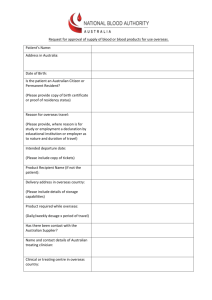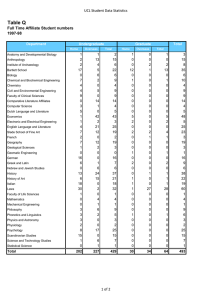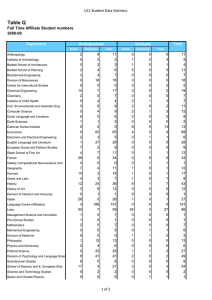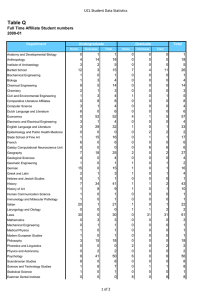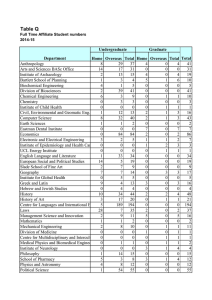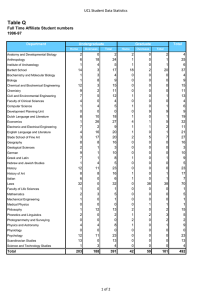Document 12962293
advertisement
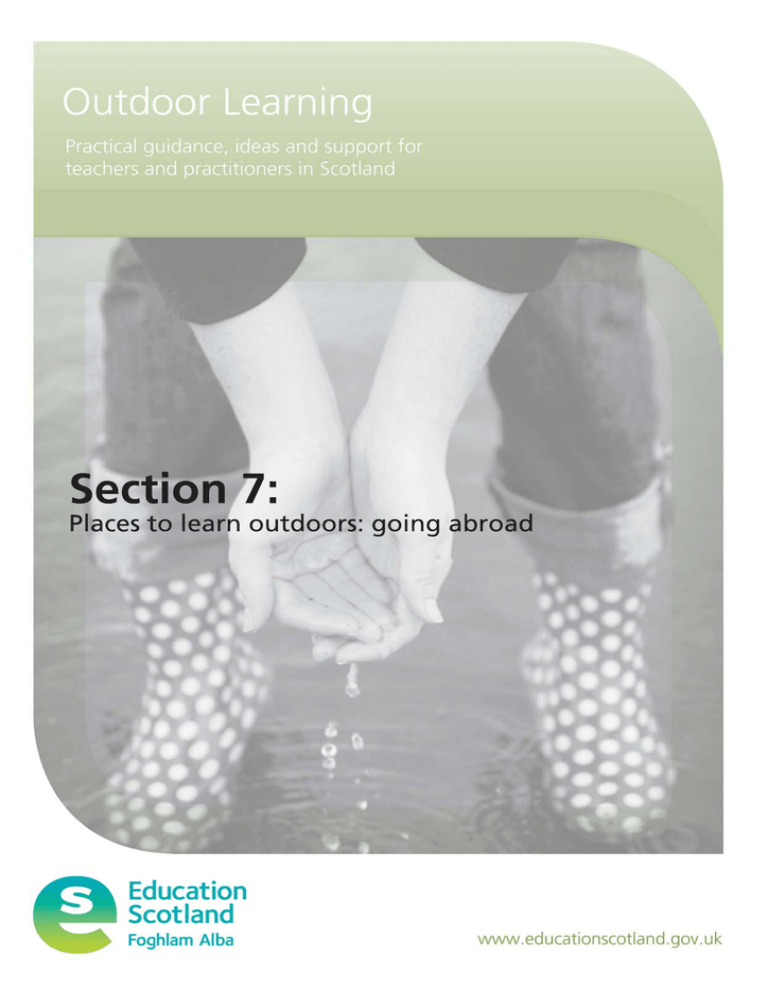
89 Section 7: Places to learn outdoors: going abroad Each year thousands of primary- and secondary-aged Scottish children benefit from a wide variety of different activities, foods, language and cultures in different parts of the world. Planning, organising and facilitating an overseas outdoor learning experience is one of the most challenging and worthwhile activities that an educator can do. The benefits of such a visit are huge but, just like any well-planned outdoor experience, there are lots of matters that require careful thought. Before deciding to lead a visit abroad, it is strongly recommended that practitioners work alongside an experienced leader, supporting an international visit. Do you really need to go overseas? One of the first questions to ask when planning an overseas trip is, ‘Do we actually need to go overseas?’ Overseas visits are expensive and need to be thought about in advance. Overseas trips should not just be a replication of something that can be undertaken in the UK. The overseas element of the experience must add value. There are thousands of outdoor learning venues in Scotland. The Education Scotland ‘Where to go in Scotland: Interactive Map’ (www.FEVDBUJPOTDotland. gPW.uk/learningteachingandassessment/approaches/outdoorlearning/placestolearnoutdoors/ wheretogomap/index.asp) provides a searchable database to assist practitioners in locating venues for outdoor learning activities. An overseas visit that might add value could include a trip to the French World War II battlefields. This type of experience is almost impossible to replicate in Scotland. An overseas trip with a more questionable objective might be an introduction to kayaking course in the south of France. This could easily be replicated in Scotland. Think about: Work with your group of learners to consider the environmental implication of your excursion. How will you off-set carbon emissions and should you include this in your budget? Where to find advice There is plenty of advice on organising overseas trips available online. The Curriculum for Excellence through Outdoor Learning (XXXFEVDBUJPOTDPUMBOEHPWVL/learningteachingandassessment/ approaches/outdoorlearning/about/cfethroughoutdoorlearning.asp) and the Scottish Government Health and Safety on Educational Excursions: Good Practice Guides (2004) (www.scotland. gov.uk/Publications/2004/12/20444/48943) documentation provide a good place to start. Local authorities, independent schools and third-sector organisations all have advice and safety guidelines that need to be followed. An overseas expedition that encompasses an extended period of time away from home and contains some degree of adventurous activity or community project is a significant undertaking. The Young Explorers’ Trust (www.theyet.org), the UK’s national association of youth exploration societies, offers advice, guidance and expedition screening via its website. The Young Explorers’ Trust also evaluates for British Standards Institution (BSI) BS 8848. WWW.EDUCATIONSCOTLAND.GOV.UK 90 (BS 8848) (www.bsigroup.com/en/About-BSI/News-Room/BSI-News-Content/General/Saferadventure-holidays) is the national standard for adventurous activities, expeditions, visits and fieldwork outside the UK. It stipulates that one person or organisation is identified as the ‘expedition organiser’ and takes responsibility for all aspects of the trip, including safety. If registering with a commercial provider for this type of activity it is worth seeing if they conform to BS 8848. If the venture is being organised in-house, then the organiser should consider applying for the standard. For youth groups this is best done through the Young Explorers’ Trust. If you are considering an exchange visit with another school or organisation a great deal of preparation and organisation is required to make the exchange visit a success. One good source of advice is Young People’s Exchange Visits (https://secureweb1.essexcc.gov.uk/EducationalVisits/ docs/oeap_guidance_on_pupil_exchange_visits.pdf). Think about: Before organising an overseas trip from whom do I need to get permission? Who do I know who might act as a critical friend to help me plan my venture? Where in the world? Once the decision has been taken to organise an overseas experience and permission has been gained, the next step is to know where to go and how to get there. The best advice will come in the form of a personal recommendation from someone that you trust. Other websites sites such as Lonely Planet (www.lonelyplanet.com/uk), The Young Explorers’ Trust (www.theyet.org/index. php) or The Royal Geographical Society (www.rgs.org/OurWork/Fieldwork+and+Expeditions/ Fieldwork+Expeditions.htm) may also prove useful, or you could try a Google search (www.google.co.uk). A Google Blog (http://blogsearch.google.com) search is useful to read first-hand accounts from people who may have undertaken similar journeys or experiences. Similarly, exploring places using tools like Google Earth (www.google.co.uk/intl/en_uk/earth/index.html) can give a really good idea of the sorts of locations that may be available. Taking young people and leading groups to less economically developed countries can be rewarding. However, this sort of trip must be carried out for the right reasons and the selection of young people needs to take into account their level of emotional intelligence. Think about: Where do your group want to go? What is your justification? How might you get there? Will there be problems with language? Can you afford it? Will I need vaccinations? How high up is the place I intend to visit? Does the altitude of the place you intend to visit present any issues for consideration? Commercial providers There are many commercial providers who will happily organise an outdoor learning experience. There is nothing wrong with this and it often moves the overall accountability to a third party. Commercial providers are, however, expensive and although they will work with a school or centre to provide a tailor-made package it is unlikely that the participants will really own the programme, journey or experience. Think about: Do you have the expertise to lead a group overseas? Do you require any additional training and qualifications to lead your group? OUTDOOR LEARNING: PRACTICAL GUIDANCE, IDEAS AND SUPPORT 91 The law Just like for any outdoor experience, the adult leader is responsible for the young people on the international visit. There are additional complexities in that whilst operating overseas the party may be subject to Scottish, European and International Law. If there is a specific enquiry regarding laws, this may have to be addressed through the embassy of the country to be visited. Appropriate and comprehensive insurance is also required. Some local authorities have insurance cover in place for educational visits within the UK and abroad. A local authority officer will be able to advise. However, organisers should always check with parents and carers that the level of insurance is sufficient for their needs. If this is not the case, parents should be encouraged to make their own insurance arrangements. Think about: How can I ensure that my risk–benefit assessments and learner consent forms take into account international law, insurance and other matters relating to the supervision of young people within the UK and abroad? Consider the learning activities that happen on your overseas visit Make space for circle time debrief sessions each day to explore and reflect on the contrasts between Scotland and your host country. These could be recorded in a daily diary. Go on a fact-finding trip to research the costs and benefits of National Parks or another tourist destination. Provide opportunities for your group to speak to local farmers, people living immediately beside the park, tourists and park rangers. Ask your group to think of ways to increase the benefits and reduce the costs of your overseas visit. Sample local food and ask the chef or cooks for the recipes. Make a food journal or blog, complete with photos and top tips from each cook. Ask your group to look for differences and similarities in the way that religion shapes different places. What ideas, values or activities would they like to bring back with them that are not prevalent in Scotland? WWW.EDUCATIONSCOTLAND.GOV.UK 92 Cost of residential experiences and international visits The cost of residential experiences and international visits are a significant factor and vary considerably depending on the distance travelled, the duration and the staff-to-student ratio. Some of the following questions may help when considering cost: s are there subsidies or bursaries available through the local authority or a charitable organisation, for example to pupils on free school meals or with particular needs or backgrounds? s could the residential or international visit form part of a fundraising enterprise project? s could you organise your own food and accommodation but buy in specialist staff and equipment? s are there other schools or establishments in the local area with whom you could join forces? Is the expertise required available elsewhere within the school or organisation? s have you considered the overall learning in relation to the planned expenditure? s how much increased cost would there be to increase the value of the experience? s is there a centre or country that is closer that can provide the experiences for learners with fewer travel costs? OUTDOOR LEARNING: PRACTICAL GUIDANCE, IDEAS AND SUPPORT
